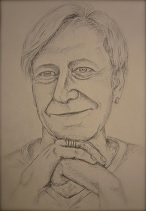 Andrzej Kopacki likes to work with the means of his own language, Polish; on one hand by bringing important texts to his country, on the other hand by writing himself. He is a Dr of German literature at the Universi’A translation has to be sexy’, he says. Indeed he doesn’t hold with the sentence »A translation should be like your partner: loyal/faithful and beautiful«; but sexy – that it has to be, all the same. When listening to Andrzej Kopacki, his issue becomes immediately clear: the translation is to be an independent literary product – independent, and yet depending on a literary original. For this he advances a little theory1 based on his own experience, consisting of five points which show the similarities between translation and theatre: A translation 1) is a performative phenomenon, 2) is based on interpretation, 3) wants everything, the total of all possibilities, 4) is free within certain bounds, 5) is an independent literary genre. In accordance with this theory the translator is treated like an author – of the translation.
Andrzej Kopacki likes to work with the means of his own language, Polish; on one hand by bringing important texts to his country, on the other hand by writing himself. He is a Dr of German literature at the Universi’A translation has to be sexy’, he says. Indeed he doesn’t hold with the sentence »A translation should be like your partner: loyal/faithful and beautiful«; but sexy – that it has to be, all the same. When listening to Andrzej Kopacki, his issue becomes immediately clear: the translation is to be an independent literary product – independent, and yet depending on a literary original. For this he advances a little theory1 based on his own experience, consisting of five points which show the similarities between translation and theatre: A translation 1) is a performative phenomenon, 2) is based on interpretation, 3) wants everything, the total of all possibilities, 4) is free within certain bounds, 5) is an independent literary genre. In accordance with this theory the translator is treated like an author – of the translation.
ty of Warsaw, translator of German literature, and author. In Poland he published a children’s book, four volumes of essays about German literature, and two volumes of poems, in Germany another two collections of poetry together with his former German translator Doreen Daume (Translator of the Month in May 2013).
He translates mainly for the Polish literary journal Literatura na Świecie, of which he is deputy editor-in-chief. Because the Polish book market is rather tight concerning the publication of foreign literature, one can say that Literatura na Świecie is privileged to be sponsored by various institutions, which enables them to publish poetry, essays, short prose and the occasional novel or fragment.
If the reader now gets the impression that translating is only a spare time occupation of our Translator of the Month, it can be said that for him the process of translating is the same as the process of writing when we’re talking about the Polish text as result of some creative act. Not for nothing his most important book is not one of his own, poetry or essays, but Walter Benjamin’s The Origin of the German Tragic Drama2. And yes, he says ‘his book’, literally; he doesn’t make a difference between his translations and his original Polish texts, thus coming back to his theory of translator-author.
I want to finish with a little example of one of Andrzej Kopacki’s translations, which I consider one of his best. The fragment is from one of the pieces of found poetry Herta Müller is famous for. The original3: „auf der Treppe zum Kanal lief dabei bloß / ein Lachwind los“. And the translation: „na schodach do kanału szkwał tylko / śmiać się śmiał“. Since an English version of the fragment doesn’t exist, the readers of this text (if they understand neither German nor Polish) have to trust me when I’m saying that the task of translating this is rather difficult. And they also have to trust me in this: the translation is really, really sexy.
1) Extracted from: Andrzej Kopacki: Przekład jako byt sceniczny. In: Andrzej Kopacki: Muszle w kapeluszu. Szkice, rozmowy, recenzje. Wrocław 2012, S. 112-116.
2) Polish: Walter Benjamin: Źródło dramatu żałobnego w Niemczech. Warszawa 2013.
3) Both quotations are extracted from Literatura na Świecie No. 1-2 2014, p. 133 – 134.
by Marlena Breuer
Andrzej Kopacki (ur. 1959, mieszka w Warszawie) – doktor habilitowany germanistyki, eseista, poeta, tłumacz niemieckojęzycznej liryki i prozy, literaturoznawca w Instytucie Germanistyki Uniwersytetu Warszawskiego, redaktor miesięcznika Literatura na Świecie. Zajmuje się współczesną literaturą niemieckojęzyczną i problematyką polsko-niemiecką, tłumaczył m.in. Hansa Magnusa Enzensbergera, Waltera Benjamina, Hannah Arendt, Michaela Krügera, Martina Pollacka, Bertolta Brechta i Gottfrieda Benna, Arno Holza, Maxa Webera, Golo Manna, Christiana Grafa von Krockowa, Joachima Festa . Wyróżniono go m.in. nagrodą dla tłumaczy Fundacji Roberta Boscha (2000) i za twórczość liryczną nagrodą promocyjną im. Mörikego (2006).
Relying on the structure and methodology of classical and postclassical [...]
For further information on translation, the TransStar project and the [...]
Relying on the structure and methodology of classical and postclassical [...]
Sir or Madam, In co-operation with KulturKontakt Austria, the Austrian [...]
Five short films with translations (videopoetry) were made as part [...]
Translating Cube: Six Sides of European Literature and Translation Berlin, [...]
Programme (PDF)
Five short films with translations (videopoetry) were made as part [...]
Translating Cube: Six Sides of European Literature and Translation Berlin, [...]
Programme (PDF)
Translating Cube in Tübingen Reinold Hermanns: SWR2 Journal am Mittag, [...]
Being Exchanged: Between Paris, Stuttgart and Ivano-Frankivsk Yuri Andrukhovytsh, Lubomír [...]
Five short films with translations (videopoetry) were made as part [...]
Bookstore: http://www.edition-fototapeta.eu/geschichten-erzaehlen
More here (PDF). Bookstore: https://knjigarna.ff.uni-lj.si/si/izdelek/1623/pet-poti-do-prevoda/
Five short films with translations (videopoetry) were made as part [...]
Bookstore: http://www.edition-fototapeta.eu/geschichten-erzaehlen
More here (PDF). Bookstore: https://knjigarna.ff.uni-lj.si/si/izdelek/1623/pet-poti-do-prevoda/
Translating Cube: Six Sides of European Literature and Translation Berlin, [...]
Programme (PDF)


